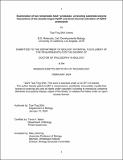Examination of two remarkable AAA+ proteases: unraveling substrate-enzyme interactions of the double-ringed ClpAP and direct thermal activation of HslUV proteolysis
Author(s)
Shih, Tsai-Ting (Irene)
DownloadThesis PDF (5.939Mb)
Advisor
Baker, Tania A.
Terms of use
Metadata
Show full item recordAbstract
AAA+ (ATPases associated with diverse cellular activities) proteases are degradation enzymes, which together with other molecular machines, including disaggregases and chaperones, are critical to the maintenance of cellular protein homeostasis. Different members of this quality control network swing into action from the moment the nascent polypeptide emerges from a ribosome’s exit channel facilitating proper folding to the end of a protein’s lifetime when damaged and unnecessary proteins are removed by degradation. Cells are subject to varying environmental conditions and stressors that impact the health and integrity of their proteomes, conditions that render these protein-quality control enzymes especially important. One arm of these responses is energy-dependent protein degradation by AAA+ proteases. AAA+ proteases contain two major catalytic components, an ATP-dependent unfoldase and an associated peptidase, which can be genetically fused or as two independent proteins docked together. All AAA+ mechanoenzymes use energy released from continual ATP hydrolysis cycles to perform work on other macromolecular substrates. In the case of the ring-shaped unfoldases, their axial channels are lined with pore loops that bind and translocate along the substrate; these translocation power strokes can, in turn, exert an unfolding force on structured parts of this protein and once unfolding is successful the remaining polypeptide can be processively translocated into the partner peptidase for proteolysis. Here, I provide evidence regarding how high growth temperatures activate degradation by the AAA+ protease HslUV. Furthermore, I establish an initial map of sequence determinants located within the substrate that provides the ClpAP protease with contacts to enhance its grip, thereby improving the probability of successful unfolding of stable protein structures, and thus the efficiency of substrate degradation.
Date issued
2024-02Department
Massachusetts Institute of Technology. Department of BiologyPublisher
Massachusetts Institute of Technology